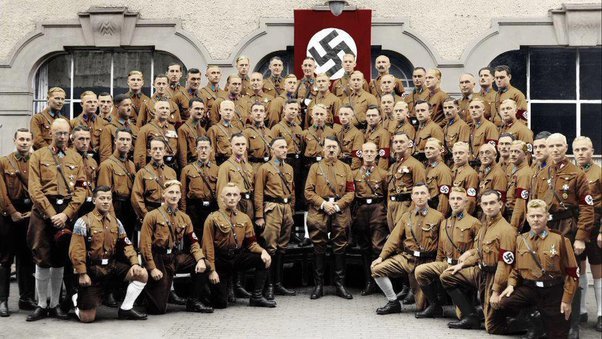Ernst Rohm.
Born in Munich, Röhm joined the Imperial German Army in 1906 and fought in the First World War. He was wounded in action three times and received the Iron Cross First Class. After the war, he continued his military career as a captain in the Reichswehr and provided assistance to Franz Ritter von Epp's Freikorps. In 1919, Röhm joined the German Workers' Party, the precursor of the Nazi Party, and became a close associate of Adolf Hitler. Using his military connections, he helped build up several paramilitary groups in service of Hitler, one of which became the SA. In 1923, he took part in Hitler's failed Beer Hall Putsch to seize governmental power in Munich and was given a suspended prison sentence. After a stint as a Reichstag deputy, Röhm broke with Hitler in 1925 over the future direction of the Nazi Party. He resigned from all positions and emigrated to Bolivia, where he served as an advisor to the Bolivian Army.
Rohm was head of the Sturmabteilung ( SA; literally "Storm Detachment" or Stormtroopers) was the original paramilitary wing of the Nazi Party. It played a significant role in Adolf Hitler's rise to power in the 1920s and 1930s. Its primary purposes were providing protection for Nazi rallies and assemblies, disrupting the meetings of opposing parties, fighting against the paramilitary units of the opposing parties, especially the Roter Frontkämpferbund of the Communist Party of Germany (KPD) and the Reichsbanner Schwarz-Rot-Gold of the Social Democratic Party of Germany (SPD), and intimidating Romani, trade unionists, and especially Jews.
The SA were colloquially called Brownshirts (Braunhemden) because of the colour of their uniform's shirts, similar to Benito Mussolini's blackshirts. The official uniform of the SA was a brown shirt with a brown tie. The color came about because a large shipment of Lettow-shirts, originally intended for the German colonial troops in Germany's former East Africa colony, was purchased in 1921 for use by his Freikorps paramilitary unit.
In November 1923, Röhm led the Reichskriegsflagge militia at the time of the Munich Beer Hall Putsch. He rented the cavernous main hall of the Löwenbräukeller, supposedly for a reunion and festive comradeship. Meanwhile, Hitler and his entourage were at the Bürgerbräukeller. Röhm planned to start the revolution and use the units at his disposal to obtain weapons from secret caches with which to occupy crucial points in the centre of the city. When the call came, he announced to those assembled in the Löwenbräukeller that the Kahr government had been deposed and Hitler had declared a "national revolution" which elicited wild cheering. Röhm then led his force of nearly 2,000 men to the War Ministry, which they occupied for sixteen hours. Once in control of the Reichswehr headquarters, Röhm awaited news, barricaded inside. The subsequent march into the city center led by Hitler, Hermann Göring, and General Erich Ludendorff with banners flying high, was ostensibly undertaken to "free" Röhm and his forces.
While crowds cheered, egged on by Gregor Strasser shouting "Heil", Hitler's armed assembly, wearing red swastika armbands, encountered Bavarian State Policemen, who were prepared to counter the Putsch. Around the time the marchers reached the Feldherrnhalle near the city center, shots were fired, scattering the participants. By the end of the gunfire, fourteen Nazis and four policemen had been killed; the putsch had failed and the Nazis' first bid for power had lasted less than twenty-four hours
Watch Rohm’s Biography expertly made by the peoples profile
In 1930, at Hitler's request, Röhm returned to Germany and was officially appointed chief of staff of the SA in 1931. He reorganised the SA, which numbered over a million members, and continued its campaign of political violence against communists, rival political parties, Jews and other groups deemed hostile to the Nazi agenda. At the same time, opposition to Röhm intensified as his homosexuality gradually became public knowledge. Nevertheless, he retained the trust of Hitler for a time. After Hitler became Chancellor of Germany in 1933, Röhm was named a Reichsleiter, the second highest political rank in the Nazi Party, and appointed to the Reich cabinet as a Reichsminister without portfolio.
As the Nazi government began to consolidate its rule, the tension between Röhm and Hitler escalated. Throughout 1933 and 1934, Röhm's rhetoric became increasingly radical as he called for a "second revolution" that would transform German society, alarming Hitler's powerful industrial allies. He also demanded more power for the SA, which the Reichswehr saw as a growing threat to its position. Hitler came to see his long-time ally as a rival and liability, and made the decision to eliminate him with the assistance of SS leaders Heinrich Himmler and Reinhard Heydrich. On 30 June 1934, the entire SA leadership were purged by the SS during an event known as the Night of the Long Knives. Röhm was taken to a prison in Munich and executed on 1 July.
Born
Ernst Julius Günther Röhm
28th November 1887
Munich, Bavaria, German Empire
Died
1st July 1934 (aged 46)
Munich, Munich-Upper Bavaria, Nazi Germany



